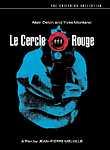 Croupier (Mike Hodges, 1998)
Croupier (Mike Hodges, 1998)I saw Hodges' second collaboration with Clive Owen, I'll Sleep When I'm Dead, when it came out a couple of years ago, and was underwhelmed. It was cold and slow and no fun at all. This is much better, though, with a dark sense of humor and a slick plot, and probably the best performance I've seen from Owen. Like all good noir, it's about 90% narration, but it's coolly ironic narration, and there are at least two femme fatales. The ending confused me a bit, but otherwise this was a near-perfect thriller.
 Infernal Affairs (Andy Lau & Alan Mak, 2002)
Infernal Affairs (Andy Lau & Alan Mak, 2002)It's strange to me that this is being remade by Martin Scorsese, because it's so heavily influenced by American thrillers that a remake seems especially redundant. For all its praise and success (two sequels followed in quick succession), it's a stylish but empty movie, and it seems to me that if it were an American film it wouldn't have gotten so much attention. There is one really taut and suspenseful sequence, with a drug bust played on both sides by the gang mole and the police mole, but otherwise you never get a sense of who these characters are or what they're going through living stressful double lives. As a result, it's hard to care about all the conversions and confrontations at the end. I hope Scorsese will add some depth, but I still see no reason for this movie to be remade at all.
 Le Cercle Rouge (Jean-Pierre Melville, 1970)
Le Cercle Rouge (Jean-Pierre Melville, 1970)This has got to be the longest, slowest heist movie I have ever seen. I realize it's considered a masterpiece, and I did enjoy the last Melville movie I saw (Bob Le Flambeur), but for long stretches of the film I was honestly bored. The central heist sequence, which doesn't come until 90 minutes into the movie, is impressively orchestrated and almost entirely dialogue-free. But overall I found this minimalist to the point of distraction, and a bit of a disappointment.
 Straw Dogs (Sam Peckinpah, 1971)
Straw Dogs (Sam Peckinpah, 1971)Maybe this is an odd point of entry for Peckinpah films, since he's known mainly for his Westerns, but it's obviously got a lot in common with that genre, with the lone man required to step up and make a stand against encroaching lawlessness. One of the things I love about Michael Mann movies is the way they so thoroughly explore the idea of masculinity, and Peckinpah's obviously doing the same sort of thing in this film (and, it would appear, in most of his other work as well). At first it seems like Peckinpah has unbridled contempt for Dustin Hoffman's passive-aggressive nebbish of a character, and that only when he gives in to violence and brutality does he live up to the director's idea of manliness. But in the course of becoming a man, Hoffman's David loses everything, and ultimately Peckinpah seems to be equating the natural masculine state with ugliness and even inhumanity. I kind of prefer Mann's more layered appraoch, but damn if that siege sequence wasn't awesomely constructed.
4 comments:
Too bad you didn't like Le Cercle Rouge, that's one of my favorite movies. (My mom thought it was boring, though.) It's interesting that you mention the exploration of masculinity in Mann and Peckinpah, because I think that's Melville's subject, too (in his crime films), though in a different way.
Well, I didn't dislike Le Cercle Rouge, I just found it slow and monotonous at times. I think you're right that Melville is also exploring masculinity (I found it more evident in Bob le Flambeur), but it's an old-fashioned, elegant sort of masculinity. Someday I am going to write an essay called "Mann and Manliness" which will explicate my thoughts on Mann, who I think is the best (and perhaps only) "manly" filmmaker working today.
Ooh, I am intrigued by this. Can you tell me more about this essay? (assuming you're too busy to write it anytime soon.) Why "only"?
Any essay with a title like that has to be good.
Well, maybe "only" was a little hasty. Offhand, I can think of at least three working directors (Scorsese, Eastwood, Toback) who are exploring manliness regularly in their work; there are probably more, especially if you take in world cinema.
But I think that Mann has really distilled his ideas about men and masculinity into a distinctive thesis that he's refined over time; you can really see how certain vague themes in Thief really coalesce in Heat (which I think is one of the best movies of the last 20 years). He's always exploring the way that emotionally unavailable men seal themselves off in these incredibly macho professions (cop, criminal, boxer, TV news producer, hitman, etc.) and then try to come to terms with their own lack of emotions, alternately rejecting their work for the way it closes them off from relationships and embracing it for the way it excuses them from having any feelings. I think he is the foremost chronicler of the way that traditionally masculine men relate to women in a world that is increasingly hostile to traditional masculinity. He may not be the director who best understands relationships overall, but I think he is the one who best understands that particular kind of relationship, and how it fits in with a certain conception of what it means to be a man.
Anyway, that's just a few random thoughts; obviously I'd want to develop them further by more closely studying Mann's films. I'm hoping to write something to tie in with his next movie (which unfortunately isn't scheduled to open until next summer).
Post a Comment